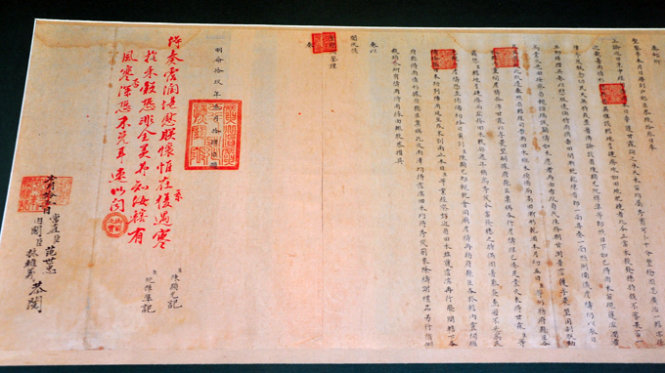Châu bản triều Nguyễn is a collection of administrative documents and official records from the Nguyễn Dynasty (1802–1945). It is a significant part of Vietnam’s cultural documentary heritage, consisting of decrees, official communications, reports, and other documents related to the governance and management of the country. These documents were primarily written in Classical Chinese and Nôm script, reflecting the careful governance and detailed administrative methods of Vietnam’s last feudal dynasty.
1. Content and Historical Value
Châu bản triều Nguyễn documents a wide range of important national issues, from royal decrees, administrative management, military affairs, and economic policies, to diplomatic and religious activities. The documents also include royal orders with the stamp of “châu phê” (royal approval), indicating the king’s direct input. These records not only reflect policies but also reveal the leadership style, vision, and concerns of the Nguyễn kings regarding their territories and people.
2. Cultural and Artistic Value
Châu bản holds significant artistic value, particularly in its exquisite calligraphy in Nôm and Classical Chinese. The handwritten copies, approved by the king and his officials, reflect the diligence and responsibility involved in governing the nation. The intricate script and presentation of these documents emphasize their political solemnity and grandeur.
3. UNESCO Recognition as a World Documentary Heritage
In 2014, Châu bản triều Nguyễn was recognized by UNESCO as a World Documentary Heritage under the Memory of the World Programme for the Asia-Pacific region. This recognition highlights the exceptional value of these documents in preserving valuable information about Vietnam’s history, culture, and society, as well as the governance methods and state organization during the feudal era.
4. Importance for Research and Study
Châu bản triều Nguyễn is an invaluable resource for researchers and scholars to better understand the administrative system, policies, and historical events of Vietnam during the Nguyễn dynasty. It provides essential documentation for studying the development of Vietnamese feudal society, diplomatic relations with neighboring countries, and the policies implemented to develop the nation during different Nguyễn reigns.

